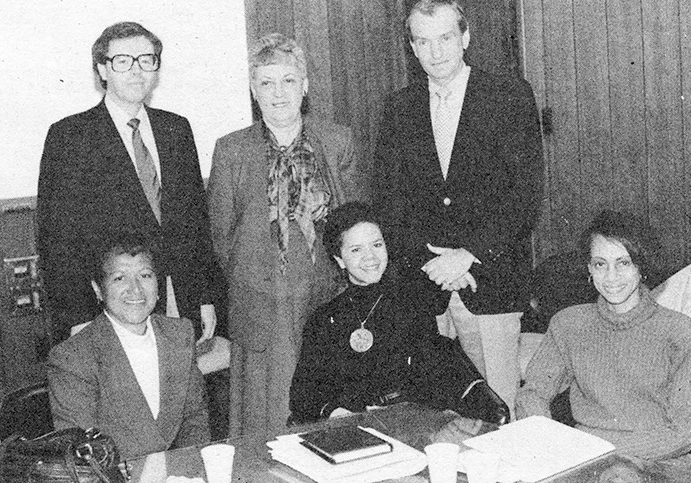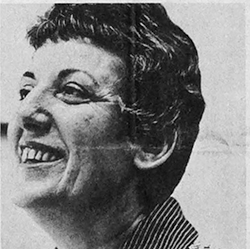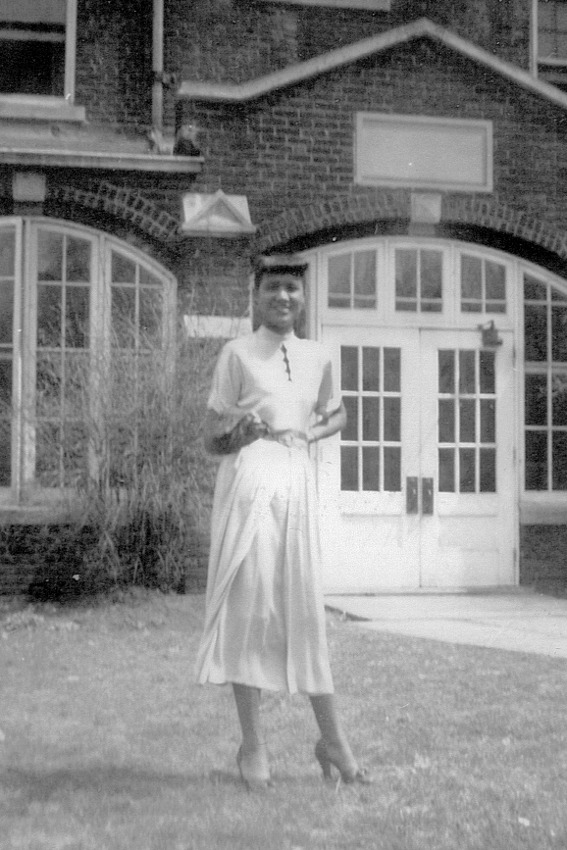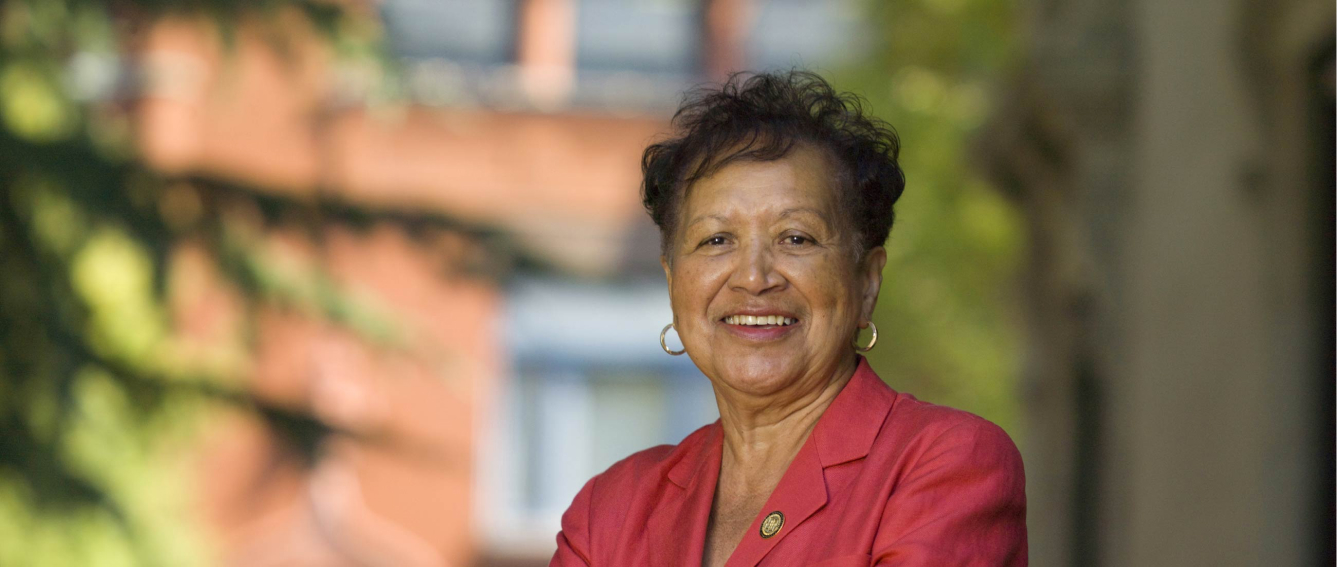Rothenberg, Harris: Pioneering social work deans who smashed the glass ceiling
As the new VCU School of Social Work dean prepared to start her job, she took stock of several key challenges.
SOCIAL WORK MONTH: 2021: ORIGIN STORIES
How could the program work more collaboratively with other academic units to offer more educational opportunities that cut across related disciplines? How could the school provide better access and opportunities for students regardless of socio-economic status?
And what about extending the reach of the program beyond Richmond, dealing with unprecedented student enrollment and improving national rankings?
This very well could be a checklist Beth Angell, Ph.D., compiled upon becoming the school’s 10th dean in the summer of 2018.
But the list and the challenges are nearly 50 years old, and the dean is not Angell. In fact, they are two lists belonging to two deans – the first women to lead the school, Elaine Z. Rothenberg (1972-82) and her successor, Grace E. Harris, Ph.D. (1982-91).

The parallels across eras are indeed uncanny. The school is always looking to provide new opportunities for interdisciplinary learning and research, as evidenced by social work faculty participating in VCU’s iCubed, the Institute for Inclusion, Inquiry and Innovation; and by academic offerings such as M.S.W. certificates in partnership with the Department of Gerontology, the Wilder School of Government and Public Affairs, and the Department of Family Medicine and Epidemiology.
One of Angell’s key goals for students is to double the number of available scholarships to make a degree more affordable and to diversify the student population and workforce. Record enrollment for the school in Fall 2020, nearly 1,000 students, was due in part to an increase in students joining the fully online format of the M.S.W. Program. Launched in Fall 2019, the online track made the program available outside of Virginia for the first time ever. The school has continued to maintain a high national standing for decades, including its most recent No. 25 ranking in U.S. News and World Report’s list of best graduate schools for social work.
The Rothenberg Era
Rothenberg assumed leadership of the state’s only graduate school of social work, with 32 faculty and a then-robust enrollment of 225 students in 1972, calling social work “the conscience of society,” according to an article about her hiring in the Medicovan, a Medical College of Virginia publication.

Under her 10-year leadership, she grew both the faculty ranks and continued to increase enrollment by adding academic programs and expanding access to degree programs to students in northern Virginia. She led the creation in 1974 of an advanced standing M.S.W. track that allowed B.S.W. graduates to complete their master’s in a year, followed by the development of the B.S.W. Program in 1975 and the Ph.D. Program in 1978.
Rothenberg didn’t call it by name, but she foresaw the need for macro-social work, noting in the Medicovan article, “There is an increasing number (of students) that want to work with groups, institutions and communities,” and not just as caseworkers.
Today, the school has a dedicated curriculum track in the M.S.W. Program that focuses on social work administration, planning and policy practice.
The one major difference over the eras is in field requirements. The Medicovan story described master’s students having to complete at least 20 hours in a practicum at a community agency. Today, M.S.W. students have two field placements that total more than 1,000 hours.
I like to think we are already identified as one of the best schools of social work in the country. I hope we can move toward being the best.
Elaine Z. Rothenberg, 1972
Rothenberg earned her master’s in social work at Smith College in Massachusetts and worked in professional practice before joining the school’s faculty in 1960. She was named Social Worker of the Year for Central Virginia in 1965 and became associate dean in 1967.
She ran unsuccessfully for president of the National Association of Social Workers but was serving as its treasurer when she became dean. She had previously served on the NASW board of directors and as chair of the task force on social services. She went on to serve as chair of the Council on Social Work Education’s Commission on Accreditation.
Following her tenure as dean, the school established the Elaine Rothenberg Social Work Award, an annual honor that goes to one student from each of the B.S.W., M.S.W. and Ph.D. programs. Rothenberg, though, didn’t slow down after stepping away from the school. She became the first woman at VCU to serve at a vice-presidential level, becoming acting associate vice-president for academic affairs in 1984. She received the VCU Presidential Medallion in 1988. She died in 1994.
As Rothenberg looked ahead, some 50 years ago, she saw a bright future. “I like to think we are already identified as one of the best schools of social work in the country,” she told the Medicovan. “I hope we can move toward being the best.”
The Harris Era
Harris continued to push the school forward to realize Rothenberg’s goal. But her story is more complex. She married in the summer of 1954 and was interested in pursuing her master’s at the Richmond Professional Institute, a precursor to VCU, that fall. She met with then-School of Social Work director George Kalif, who told her segregationist state laws – Virginia’s Massive Resistance legislation – wouldn’t allow her to be admitted.
She applied to Boston University instead, and, interestingly, BU asked Kalif to interview her as part of its admission process. “So I saw him a second time. And he concluded that session by saying, ‘I wish I could take you here,’ ” Harris said in a 2007 oral history interview that is in VCU’s archives.

She spent the 1954-55 academic year in the master’s program at BU, where she met Martin Luther King Jr., then a doctoral student in theology. “A remarkable theologian who was head of the department there often had the Black students to meet in his home and served as a kind of advisor to many of us,” Harris said in the same interview. “So on those occasions I did meet Martin Luther King, and he was like all the rest of us, a struggling student.”
Harris returned to Virginia and became a caseworker in Hampton in the Department of Public Welfare, then a caseworker and supervisor at the Department of Welfare and Institutions in Richmond. She was able to enroll at RPI in Fall 1959, earning her M.S.W. the following spring. She served as executive director of the Friends’ Association for Children and director of the Richmond Community Action Program in the early 1960s.
In 1967, a year before the official merger that created VCU, Harris joined the School of Social Work as an assistant professor, later becoming the director of student affairs, an associate professor and finally associate dean. She earned both her M.A. and Ph.D. from the University of Virginia in the mid-1970s. She succeeded Rothenberg as dean in 1982.
… I actually love VCU. There is something about it that just resonates with who I am and I with it. That sets the stage for whatever I would say, and that love has grown over the years.
Grace E. Harris, Ph.D., 2006
Harris never expressed anything but her devotion for VCU, despite her original rejection. “I was saying to one of the leadership groups quite recently that I actually love VCU,” she said in a separate oral history interview in 2006. “There is something about it that just resonates with who I am and I with it. That sets the stage for whatever I would say, and that love has grown over the years. It was when I joined the faculty that I really began to really think about how I felt about the University and how I fit within it.”
Harris continued to build on Rothenberg’s expansion in northern Virginia, increasing enrollment, and looked to the southwest to create program options for students in that part of the state. “That was really a good move for the school,” she said in the 2007 interview. “We grew and expanded, in locations as well as numbers.”
Challenges, she said in the 2007 oral history, included acceptance from her former faculty colleagues after becoming dean; ensuring that, as a professional school, social work was recognized and valued within the university like other academic units; and pushing for national stature.
“Some of that had begun under Elaine … but I continued with a lot of activity at the national level to make our school better known, and to have a ranking nationally that was among the top in the country,” Harris said.
Like Rothenberg, whom she considered a mentor, Harris moved into senior university leadership following her tenure as dean, becoming the first woman and first African American to be named provost and vice president for academic affairs in 1993, and twice serving as VCU’s acting president. And like Rothenberg, Harris also received VCU’s Presidential Medallion, as well as the university’s Presidential Award for Community Multicultural Enrichment and the Riese‐Mellon Award. The Dr. Grace E. Harris Merit Scholarship for incoming freshman social work students was established in 2000.
People alway come up to me and say, ‘No matter how many people were in a room, your mother always made me feel like the only one.’
Gayle E. Harris
Harris’ daughter, Gayle E. Harris, M.S.W., QMHP, said in a recent interview that her mother and Rothenberg were extremely close.
“Elaine’s name was always in our house,” Gayle Harris said. “She was her supervisor, her boss, but she was her mentor. My mother looked up to her. We actually did a lot of family things together. It was not just work.”
Gayle Harris said that her mother also had a strong connection with then-VCU President Eugene Trani, Ph.D., whose leaves of absence for research created the opportunities for Grace Harris to serve as acting president.
“They had a wonderful relationship, yes,” Gayle Harris said. “He believed in her, and she got all the things she was fighting for from him: respect, recognition, elevation, appreciation. She was able to be honest with him.”
Grace Harris said she was Trani’s first hire as president when he offered her the job as provost. The only thing they didn’t see eye to eye was an early morning meeting where the offer was proffered.
“I told him I didn’t like to get up early, and especially not on a Saturday morning,” she said in the 2007 interview. “I don’t recall any serious issues about race or gender in the job. I was here, I was known in the university, I was known in the community. So, in those ways, I can truthfully say it was a great job because it brought community and university together, and that was President Trani’s goal when he came.”
“I tell everybody that is the best job I ever had at VCU,” she said in the 2006 interview.
No matter how progressive the predominantly male leadership was, they didn’t always understand the challenges of working women,” Gayle Harris said.
“It wasn’t just that one early meeting,” she said. “She would say, ‘These men schedule these meetings early, but they don’t have people to get ready for school, they don’t have to prepare breakfast. They have nothing to do but just be there.’ That made an impact on me and my life, one of those things where the larger society doesn’t take it into consideration, and it turns out it could be discriminatory. They wonder why can’t she get up early, but she’s already been up for two hours and had to get the kids out to school.”
She relates a story from a few years ago about visiting a friend in Minnesota who was selling her house, and a chance encounter with a woman who came to the open house. Harris mentioned she was visiting from Richmond, and the woman said she had worked at VCU. “I said, ‘Oh, maybe you know my mother,’ and told her my mother’s name. She said, ‘Grace Harris changed my life. I love your mother.’ ”
The woman went on to say that as a VCU employee in the 1970s, she became pregnant and was going to be fired because there were no employment guarantees at the time. “My mother fought for her, and they created a job she could do and still have her baby. … I thought, how am I in the middle of Minnesota and this lady knows my mother and what she did for her?”

Grace Harris died in 2018, and the Grace E. Harris Leadership Institute honors her commitment to education, collaboration and equity. Grace E. Harris Hall is a campus building that is home to VCU’s Student Services Center.
“When she had the building named after her, Douglas Wilder described my mother as a brush for a fur coat,” Gayle Harris said. “He went on to explain that the bristles are tough but it smooths everything out. I thought, ‘Wow, OK.’ ”
Her mother’s legacy, she said, also includes strong advocacy for women’s equity, resiliency in the face of racism that led to her initial rejection from RPI in 1954, and her ability to connect with everyone.
“She took a lot of effort to make sure all women, and especially Black women, were elevated and appreciated and recognized,” Gayle Harris said. “I don’t think she had any bitterness about being denied admission. I think it’s part of her legacy because it’s like you keep trying and you can succeed.
“She loved teaching others, learning from others. She loved to travel and meet people and was always interested in their stories and lives. What made her endearing to so many people, she accepted them as they were and just learned from them. People alway come up to me and say, ‘No matter how many people were in a room, your mother always made me feel like the only one.’ ”
(Thank you to Allison Bell, VCU social work’s executive assistant to the dean, for her research that provided source material for this story.)
Categories Alumni, Community, Education, Faculty and staffTagged Beth Angell, Elaine Z. Rothenberg, Eugene Trani, Gayle E. Harris, George Kalif, Grace E. Harris, History, Martin Luther King Jr., Origin Stories, Social Work Month, Social Work Month 2021